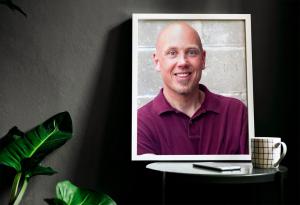
Lyn Johnson and Mike Kitko Join Social Media Expert Candice Georgiadis
Lyn Johnson takes us on a journey about the gender wage gap while Mike Kitko delves into 'impostor syndrome' in interviews by Candice Georgiadis
Impostor syndrome is garnering more attention and Mike Kitko, along with interviewer Candice Georgiadis, delve deep into this serious problem people face. An excerpt of the interview is below, catch the whole interview here.
We would like to explore and flesh out the experience of Imposter Syndrome. How would you define Imposter Syndrome? What do people with Imposter Syndrome feel?
My experience with the imposter syndrome is absolute self-rejection. When I was in deep in the chaos of the imposter syndrome, I felt like I held no value or worth in the world, and that I was just disposable. I was handed accolade after accolade, and reward after reward throughout my entire life — starting from 4 years old on. I felt none of it. I just felt like I was always in the right place at the right time, they were recognizing me out of pity and sympathy, or that I just had an unfair advantage. No matter how hard I worked or how much I knew or performed or achieved, I always felt on the cusp of complete and absolute failure.
My life was exhausting because I felt like everyone was valuable except for me. Looking back at it, it seems impossible, but I felt I was just taking up space and had nothing to offer anyone. I was just a nuisance.
I spent my entire life trying to not be found out. I hid who I was, my fears, and my weaknesses. I played roles and pretended that I had it all figured out. I shape-shifted to be who I thought I needed to be in order to be accepted and valued. I wore masks, and I eventually came close to sticking a gun in my mouth. At that point I knew I was missing something.
What are the downsides of Imposter Syndrome? How can it limit people?
People with the imposter syndrome feel they can’t be themselves and succeed. They don’t feel good enough. One of the pieces of advice we’re taught — “fake it until you make it” — is the imposter syndrome spoken out loud. The expression says human beings need to be perfect and have it all figured out all the time. Imposters become paralyzed if someone finds out they are not perfect or there’s something they don’t know or have.
Candice Georgiadis has interviewed a number of people regarding the gender wage gap, and this interview with Lyn Johnson is just as interesting and thought-provoking as the others. Read a piece below and learn a lot more in the full interview.
Even in 2019, women still earn about 80 cents for every dollar a man makes. Can you explain three of the main factors that are causing the wage gap?
There are so many institutional forces at play that encourage everyone (including women themselves) to undervalue women’s skills. We hold collective beliefs about women that include an expectation that they will place the interests of their communities above their own interests. To that end, we expect women to dispense of their time and talents for free or at a discount — a factor that contributes immensely to the wage gap. (Note: A community mindset can be an incredibly positive force, but when juxtaposed with the expectations we have for men, which permit and encourage them to act in their own interests, we place women at a comparative disadvantage.) Couple those gendered expectations with the fact that the unpaid work of women who care for families has been assigned literally zero economic value in terms of dollars (their work is not even counted in national GDP numbers) and you have a recipe for the societal undervaluing of their skills and an undermining of their earning capabilities.
Our government and societal institutions have created a ‘choice funnel’ that skew women’s decisions towards leaving the workforce after children. Without paid parental leaves or affordable childcare options, and with tax & school systems that favor one-earner married households, women’s ability to remain in the workforce and achieve a balanced family life is very constrained.
A huge imbalance still exists between women and men in the allocation of domestic and caregiving work, which subverts women’s earning potential. Married women with children spend less time earning in the marketplace, less time in leisure activities, and more time in unpaid work in comparison to their male counterparts.
While the wage gap is certainly something we need to be concerned about, the larger issue we need to address is the wealth gap. Women are accumulating financial resources at 1/3rd the rate that men are. Which means women are more likely to find themselves in positions of economic vulnerability and are more likely to be impoverished after retiring. The wealth gap is the end result of a lifetime of wage disparity and women’s lack of access to capital. Wealth is the number to watch.
Two important topics receive much-needed attention in these interviews by Candice Georgiadis. The business world needs more entrepreneurs to push back against the big company gender wage issue and impostor sentiment.
About Candice Georgiadis
Candice Georgiadis is an active mother of three as well as a designer, founder, social media expert, and philanthropist. Candice Georgiadis is the founder and designer at CG & CO. She is also the Founder of the Social Media and Marketing Agency: Digital Agency. Candice Georgiadis is a Social Media influencer and contributing writer to ThriveGlobal, Authority Magazine, and several others. In addition to her busy work life, Candice is a volunteer and donor to St Jude’s Children’s hospital.
Contact and information on how to follow Candice Georgiadis' latest interviews:
Website: http://candicegeorgiadis.com/
Email: CG@candicegeorgiadis.com
LinkedIn: https://www.linkedin.com/in/candice-georgiadis-34375b51/
Twitter: https://twitter.com/candigeorgiadis @candigeorgiadis
Candice georgiadis
candicegeorgiadis.com
+1 203-958-1234
email us here
Visit us on social media:
Twitter
LinkedIn
Distribution channels: Business & Economy, Companies, Education, Politics, Social Media
Legal Disclaimer:
EIN Presswire provides this news content "as is" without warranty of any kind. We do not accept any responsibility or liability for the accuracy, content, images, videos, licenses, completeness, legality, or reliability of the information contained in this article. If you have any complaints or copyright issues related to this article, kindly contact the author above.
Submit your press release


